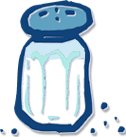|
High blood pressure (hypertension) is dangerous because it
causes the heart to work harder. When the heart works too
hard, the
strain can contribute to life-threatening conditions such
as a heart attack or stroke. High blood pressure also damages
arteries, leading to arterial disease.
It's well-established that sodium reduction is useful for
people with hypertension, and for those trying to avoid it.
But how much of a reduction is enough? A recent study published
in The New England Journal of Medicine reports that
salt reduction might have a greater effect on your blood pressure
than you might think. In the study, 412 subjects were randomly
assigned to consume a diet typical of the normal American
diet, or the DASH (Dietary Approaches to Stop Hypertension)
diet.
 The DASH diet is rich in fruits, vegetables and low-fat dairy.
Within each group, subjects ate foods with high, intermediate
and low levels of salt for 30 days. The researchers discovered
that reducing sodium intake from the highest to the intermediate
level reduced average systolic blood pressure in the control
group and the DASH group. The greatest reduction occurred
in subjects who consumed the low-salt DASH diet. The DASH diet is rich in fruits, vegetables and low-fat dairy.
Within each group, subjects ate foods with high, intermediate
and low levels of salt for 30 days. The researchers discovered
that reducing sodium intake from the highest to the intermediate
level reduced average systolic blood pressure in the control
group and the DASH group. The greatest reduction occurred
in subjects who consumed the low-salt DASH diet.
Do you have too much salt in your diet? Chances are, the
answer is yes. Talk to your doctor about the fundamentals
of a low-sodium, low-fat diet rich in vitamins and minerals.
Information on high blood pressure can also be found on the
American Heart Association's website: http://www.americanheart.org.
Reference:
Sacks F, Svetkey L, Vollmer W, et al. Effects on blood pressure
of reduced dietary sodium and the dietary approaches to stop
hypertension (DASH) diet. The New England Journal of Medicine
January 2001:344, pp3-9.
|



